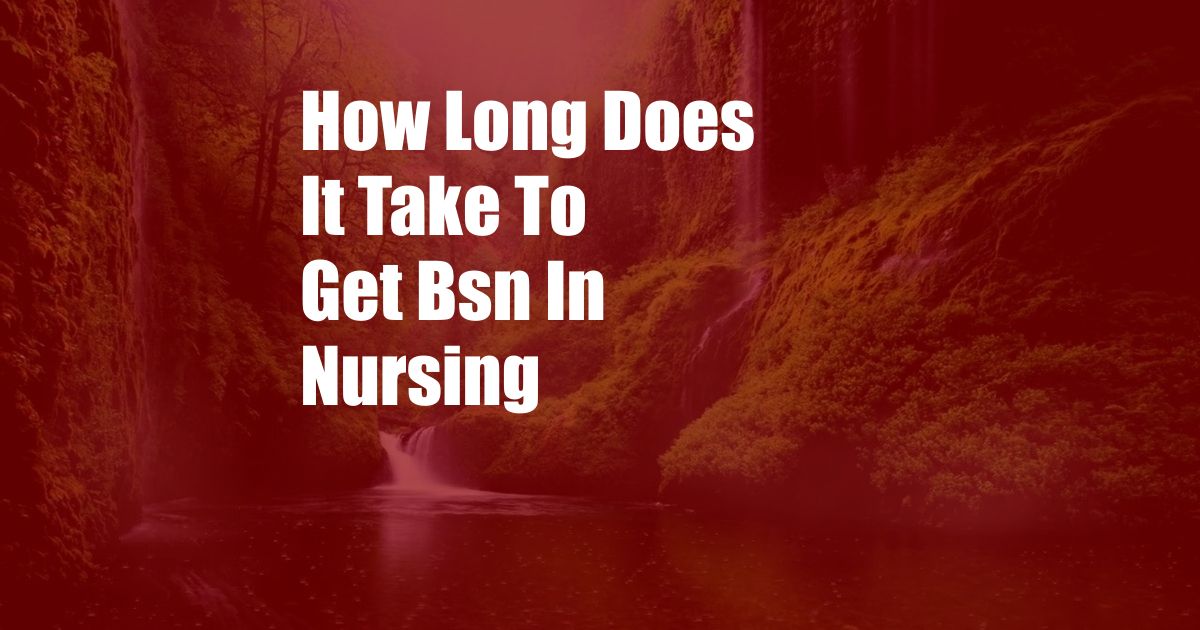
How Long Does It Take to Get a BSN in Nursing?
Nursing is a rewarding and challenging career that offers opportunities for personal growth, helping others, and making a difference in the world. If you’re considering a career in nursing, one of the first questions you’ll likely have is, “How long does it take to get a BSN?”
The answer to this question depends on a few factors: whether you already have a bachelor’s degree, how many nursing courses you’ve already taken, and whether you plan to attend school full-time or part-time.
Accelerated BSN Programs
If you already have a bachelor’s degree in a non-nursing field, you may be eligible for an accelerated BSN program. These programs are designed for students who want to earn their BSN in a shorter amount of time. Accelerated BSN programs typically take 12-16 months to complete if you attend full-time.
To be eligible for an accelerated BSN program, you must have a strong academic record and meet certain prerequisite requirements. These requirements vary from program to program, but typically include courses in biology, chemistry, and math.
Traditional BSN Programs
If you don’t have a bachelor’s degree, you’ll need to complete a traditional BSN program. Traditional BSN programs typically take 4 years to complete if you attend full-time.
Traditional BSN programs include coursework in nursing theory, clinical practice, and general education. In addition to classroom instruction, you’ll also complete clinical rotations in various healthcare settings, such as hospitals, clinics, and nursing homes.
Part-Time BSN Programs
If you’re unable to attend school full-time, you may want to consider a part-time BSN program. Part-time BSN programs are designed for students who have other commitments, such as work or family.
Part-time BSN programs typically take longer to complete than full-time programs. The length of time it takes to complete a part-time BSN program will vary depending on how many courses you take each semester.
Tips for Choosing a BSN Program
When choosing a BSN program, there are several factors to consider. These factors include:
- Accreditation: Make sure the program is accredited by the Commission on Collegiate Nursing Education (CCNE) or the Accreditation Commission for Education in Nursing (ACEN). Accreditation ensures that the program meets certain quality standards.
- Cost: The cost of a BSN program can vary significantly. Be sure to compare the costs of different programs before making a decision.
- Location: If you’re planning to attend school full-time, you’ll need to consider the location of the program. Make sure the program is located in a place that is convenient for you.
- Program length: The length of time it takes to complete a BSN program can vary. Consider how long you’re willing to commit to school before choosing a program.
- Clinical experiences: The clinical experiences you’ll have in a BSN program are an important part of your education. Be sure to ask about the clinical experiences offered by different programs before making a decision.
Expert Advice
Here are some expert tips for choosing a BSN program:
- Talk to your advisor. Your academic advisor can help you choose a BSN program that is right for you. They can also help you develop a plan to complete the program in the shortest amount of time possible.
- Visit different programs. Once you’ve narrowed down your choices, visit different programs to get a feel for the environment. Talk to the faculty and students to learn more about the program and what it’s like to attend school there.
- Consider your goals. What are your goals for your nursing career? Do you want to work in a hospital? A clinic? A school? Consider your goals when choosing a BSN program. Make sure the program offers the coursework and clinical experiences you need to achieve your goals.
FAQs
Q: How much does it cost to get a BSN?
A: The cost of a BSN program can vary significantly. Public universities typically charge less than private universities. The cost of tuition and fees can also vary depending on the state in which you live.
Q: What are the prerequisites for a BSN program?
A: The prerequisites for a BSN program vary from school to school. However, most programs require applicants to have a strong academic record and complete certain prerequisite courses, such as biology, chemistry, and math.
Q: How long does it take to get a BSN if I already have a bachelor’s degree?
A: If you already have a bachelor’s degree, you may be eligible for an accelerated BSN program. These programs are designed for students who want to earn their BSN in a shorter amount of time. Accelerated BSN programs typically take 12-16 months to complete if you attend full-time.
Q: What are the job prospects for nurses?
A: The job outlook for nurses is excellent. The U.S. Bureau of Labor Statistics projects that the number of nursing jobs will grow by 9% from 2020 to 2030. This growth is expected to be driven by the increasing demand for healthcare services as the population ages.
Conclusion
If you’re considering a career in nursing, getting a BSN is the first step. The length of time it takes to get a BSN will vary depending on your individual circumstances. However, with careful planning and hard work, you can achieve your goal of becoming a nurse.
Is there anything else you’d like to know about getting a BSN? Let me know in the comments below!